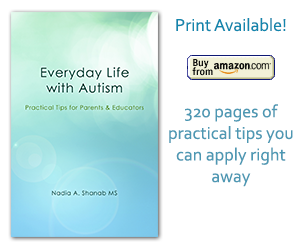By Nadia Shanab | Uncategorized
In her new book, Temple Grandin, the most famous high-functioning autistic person in the world, adds a new category of the autistic brain. Her hypothesis was scientifically confirmed by researchers. She defines her own brain as a “visual” brain. The second kind is the “verbal” brain. Recently a new category was added, namely the “pattern”
Tags: asperger's syndrome, autism, discipline, independence, parenting, research, Temple Grandin
Posted in Uncategorized | Comments Off on Categories of The Autistic Brain
By Nadia Shanab | Uncategorized
The topic of “what causes autism”, has always been at the heart of the autism community’s concern and interest. Up to this date, the real cause(s) of autism are not known yet. However, several reasons are suspected. But the most suspected causes are genetics, environmental, or combinations of both. In February 25, 2013 a study
Tags: autism, causes, developmental impairment, environmental, parenting, research, symptoms, toxic metals, toxics
Posted in Uncategorized | Comments Off on Autism Related to Higher Levels of Toxic Metals
By Nadia Shanab | Uncategorized
This is an environmental enrichment therapy that parents can provide/perform with their children at home. It improves sensory issues of smell, sight, texture, temperature, and movement. It has a significant positive effect on children with autism. The auther of this research is Michael Leon, a professor of neurobiology and behavior at the Center for Autism
Tags: autism, health, occupational therapy, parenting, research, sensory, sensory integration issues
Posted in Uncategorized | Comments Off on ‘Sensory-Focused’ Autism Therapy
By Nadia Shanab | Uncategorized
The Early Start Denver Model (DSDM) is a comprehensive behavioral program that reduces cost of special education services throughout the schooling years. When joining this program many services and therapies will be reduced. The program is clinically controlled. Social skills and interaction showed great improvement following this program. Even if the first two years in
Tags: autism, communication, early intervention, flexibility, health, occupational therapy, parenting, placement, research, social interaction, speech, symptoms of autism
Posted in Uncategorized | Comments Off on An Early Intervention Program for 12 Months Old Children with ASD
By Nadia Shanab | Uncategorized
What an amazing news for the autism community! SAP the German software company is running this project and intends to expand hiring in the US, Canada, Ireland, and Germany. The plan is to have 1% of the employees with ASD (Autism Spectrum Disorder). IT people have now recognized the talents and uniqueness of people with
Tags: asperger's syndrome, communication, discipline, flexibility, health, independence, research, social interaction
Posted in Uncategorized | Comments Off on Software Company SAP Is Hiring Adults with Autism
By Nadia Shanab | Uncategorized
Why doesn’t the grapefruit have any grapes inside? I was taken aback and shocked when a HF (high-functioning) student asked me this question. I had never thought about it before. I had never asked myself the same question. Don’t you think that the question really makes sense? How is the grapefruit related to grapes, apart
Tags: communication, consequences, flexibility, parenting, research, rewards
Posted in Uncategorized | Comments Off on What Is “Normal”? What Is “Special?”
By Nadia Shanab | Uncategorized
The new DSM 5 is due this month (May 2013). It is published by the American Psychiatric Association (APA). Three diagnosis will be removed: Aspergers Syndrome, PDD-NOS, and CDD. They will go under one diagnosis, autism. How is that going to affect parents, cliniacians, educators, advocates, and the children themselves with these conditions? Read the
Tags: asperger's syndrome, autism, communication, diagnosis, health, occupational therapy, parenting, research, symptoms of autism
Posted in Uncategorized | Comments Off on The New Diagnostic and Statistical Manual (DSM 5)
By Nadia Shanab | Uncategorized
According to “Autistica”, 24% of autistic children are non-verbal or minimally verbal. Researchers at the University of Bermingham, UK, supported by “Autistica” found that: 1- The learning of a language is tightly related to motor behaviors (like knocking a toy), and the imitation of facial experssions or gestures. The imitation of gestures and facial expressions
Tags: autism, communication, occupational therapy, parenting, research, social interaction, symptoms of autism, techniques
Posted in Uncategorized | Comments Off on A Hope for Non-Verbal Children
By Nadia Shanab | Uncategorized
Children with autism don’t respond to the games, like peek-a-boo, the way neurotypically developed kids do. They avoid the interaction with people or tune them out altogether. Remember that the poor social skills are one of the autism’s main traits. Researchers found that parents should rather play with their kids the games they like. In
Tags: autism, communication, games, research, social interaction, techniques, tips
Posted in Uncategorized | Comments Off on Playing the Child’s Favorite Game Reduces Severity of Condition
By Nadia Shanab | Uncategorized
This is the biggest study of fetal growth and autism ever. Extreme, whether big or small, growth of the fetus in the womb can be a risk factor of developing autism. Babies weighing over 4.5 kg (9lb14) or under 2.5 kg (5.5lb) at birth showed higher incidence of autism. This isn’t related to whether the
Tags: autism, baby's weight, health, parenting, research, risk
Posted in Uncategorized | Comments Off on Fetal Growth Related to Autism

